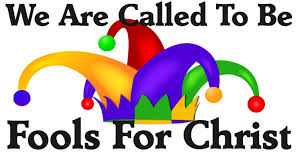I AM A FOOL FOR CHRIST, WHOSE FOOL ARE YOU?
(Memorial of St. Gregory the Great, Pope and Doctor of the Church)
First Reading: 1 Corinthians 3:18-23
Responsorial Psalm: Ps. 23(24):1-6
Gospel Reading: Luke 5:1-11
_____________________________________________
Apparently, the soundness of an action or decision with regard to the application of experience, knowledge, and good judgment could be understood as wisdom or the quality of being wise. The ‘quest for wisdom,’ provokes wonder, and this ‘wonder,’ we are told, gave birth to philosophy. Needless to say, deep wonder can give rise to questions that sound exactly like ‘Why are we here?’ ‘Where is our destination?’ ‘How did we come into being?’ ‘What is the source of our existence?’ etc. Now, wisdom seeks true and comprehensive answers to these questions provoked by wonder.’ Nevertheless, it becomes quite surprising reading/listening to the Pauline text of today’s first reading: “if anyone of you thinks of himself as wise, in the ordinary sense of the word, then he must learn to be a fool before he really can be wise. Why? Because the wisdom of this world is foolishness to God.” This clearly sheds light on the message of today’s gospel: “they left everything and followed him.” But then, how could we understand this parallelism between the two readings?
In today’s first reading, Paul takes up the reflection on the binomial “wisdom-foolishness” and adorns it with references to the Old Testament. His attention was earlier focused on the ‘foolishness’ of preaching, the ‘foolishness’ of the cross, and the ‘foolishness’ of faith. Now, the discourse is broadened and applied to the whole Christian existence: “living in Christ” involves assuming the newness of life that Christ preached and that his cross announces, even though this seems paradoxical and scandalous to the world in which we live. In other words, Paul exhorts the Corinthians to go beyond human wisdom, which often allows itself to be guided by sympathies and preferences and ends up erecting barriers that separate us from God and one another. This explains the opening verse of today’s first reading: “Make no mistake about it: if anyone of you thinks of himself as wise, in the ordinary sense of the word, then he must learn to be a fool before he really can be wise.” The Apostle points out to them much wider horizons: “Everything is yours. But you are of Christ and Christ is of God.” With this, Paul outlines before us a persuasive and comprehensive theological itinerary.
The same is true in the gospel. Jesus wanted Peter to understand that the apostolate is not a human thing nor achieved by human wisdom. The miraculous fishing leads Peter to go beyond the short human sight. When he sees the unexpected fishing, he says: “Depart from me, Lord, because I am a sinful man.” Needless to say, his encounter with “Divine Wisdom” (Jesus Christ) made him realize the insufficiency and foolishness of human wisdom, and following the directives of Divine Wisdom, he made out a great catch, which eventually made him (and his companions) “fishers of men”; they realized the need to leave everything (human wisdom) to follow Christ (Divine Wisdom), which is considered foolishness before the world.
Dear friends in Christ, in a postmodern world where ‘following Christ completely and giving one’s whole life to serve Him’ is considered foolishness, we must continue to bear witness to the faith, inspired by the Divine Wisdom, and trusting daily in Him, the same way St. Gregory the Great (Pope and Doctor of the Church) did. History obviously holds that St. Gregory’s family was very wealthy and owned estates on the island of Sicily which provided lots of income. He himself was well educated for the times and excelled in his studies, but he went contrary to the world’s wisdom and embraced what seems like ‘foolishness’ to the world by going into the monastery as a way of following Christ, the Divine Wisdom more closely. Put differently, his conversion to monastic life was not sudden but grew from a lifelong conflict between his personal desire for contemplative purity and the public duty to serve others in the “pollution” of worldly affairs. Renouncing secular life, Gregory established, on the family’s property on the Caelian Hill, a monastery dedicated to St. Andrew. May contemplating on the aspects of the life of St. Gregory and imitating his faith today (Cf. Heb. 13:7) strengthen our faith; a faith that guides our life and inspires us in the path of true wisdom, leaving everything to follow Christ, having realized the foolishness of the world’s wisdom. Thus, in the midst of the world’s challenges, we must consolidate our faith and live it in charity; we must go beyond our narrow human limits, to open ourselves to the immensity of God’s love.
Shalom!
© Fr. Chinaka Justin Mbaeri, OSJ
Paroquia Nossa Senhora de Fatima, Vila Sabrina, São Paulo, Brazil
nozickcjoe@gmail.com / fadacjay@gmail.com


